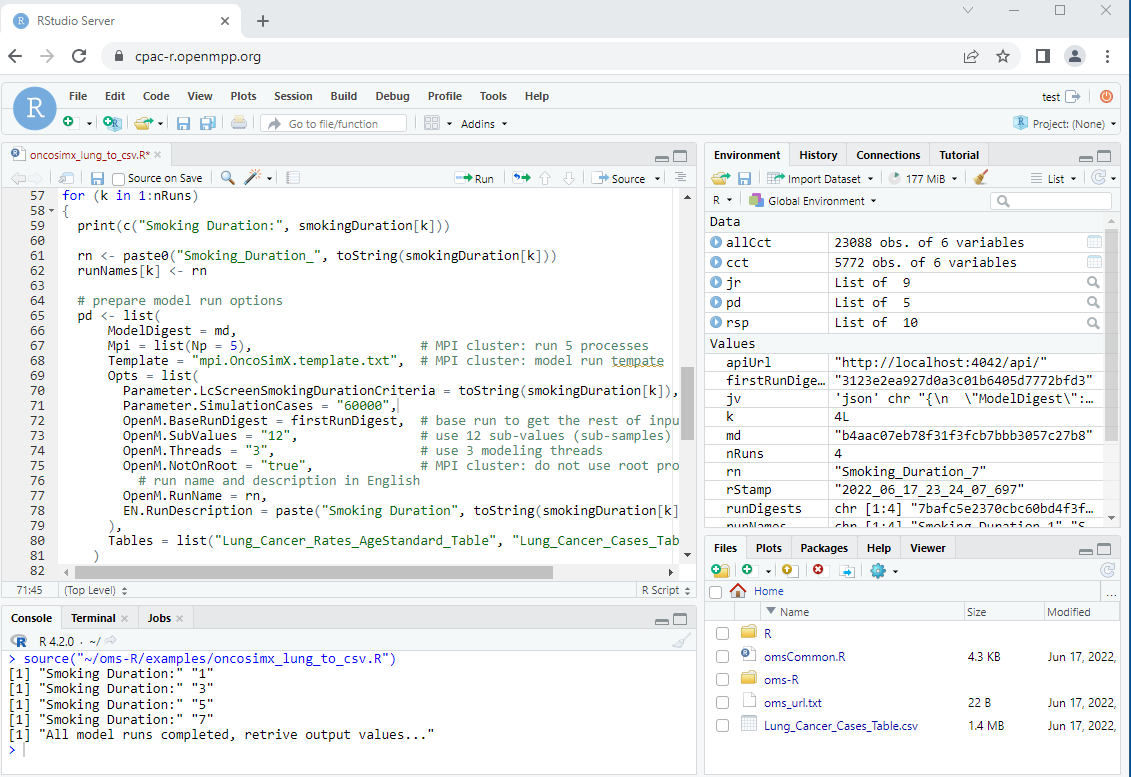Run Model from R in cloud - openmpp/openmpp.github.io GitHub Wiki
It is a convenient to use GNU R to prepare model parameters and analyze output values. There are two different R APIs which we can use for openM++ models:
- openMpp package: simple and convenient specially for desktop users, upstream and downstream analysis;
-
omsJSON web-service API: preferable choice to run models on computational clusters and in cloud.
There is also an excelent R package created by Matthew T. Warkentin available at: mattwarkentin.github.io/openmpp.
Below is an example how to run model in cloud and save results in CSV file using oms JSON web-service.
There is a similar example how to run model on desktop and do simple loop over parameter using openMpp R package.
Following R example is running very complex OncoSimX-lung model to change only LcScreenSmokingDurationCriteria parameter:
smokingDuration <- seq(from = 1, by = 2, length.out = 4)To reduce model run time we are calculating only 2 output tables: Lung_Cancer_Rates_AgeStandard_Table and Lung_Cancer_Cases_Table
and also using only 6000 simulation cases.
Also we do merge Lung_Cancer_Cases_Table rows from all model runs and saving it into Lung_Cancer_Cases_Table.csv

#
# Use R to run OncoSimX-lung version 3.6.1.5
# loop over LcScreenSmokingDurationCriteria parameter
# to output tables: Lung_Cancer_Rates_AgeStandard_Table and Lung_Cancer_Cases_Table
#
# If jsonlite or httr is not installed then do:
# install.packages("jsonlite")
# install.packages("httr")
#
library("jsonlite")
library("httr")
# Include openM++ helper functions from your $HOME directory
# on Windows HOME directory is: "C:\Users\User Name Here\Documents"
#
# if you don't have omsCommon.R then download it from https://github.com/openmpp/R/oms-R
# if you have omsCommon.R in some other location then update path below
#
source("~/omsCommon.R")
#
# Model digest of OncoSimX-lung version 3.6.1.5: "eeb246bd7d3bdb64d3e7aaefeaa828ea"
#
md <- "eeb246bd7d3bdb64d3e7aaefeaa828ea"
# oms web-service URL from file: ~/oms_url.txt
#
apiUrl <- getOmsApiUrl()
# Find first model run to use it as our base run
#
rsp <- GET(paste0(
apiUrl, "model/", md, "/run/status/first"
))
if (http_type(rsp) != 'application/json') {
stop("Failed to get first run status")
}
jr <- content(rsp)
firstRunDigest <- jr$RunDigest
# Use openM++ oms web-service to run the model 4 times with 6000 simulation cases
# and different values of LcScreenSmokingDurationCriteria parameter:
#
# OncoSimX-lung_mpi -Parameter.SimulationCases 6000 -Parameter.LcScreenSmokingDurationCriteria 1
# OncoSimX-lung_mpi -Parameter.SimulationCases 6000 -Parameter.LcScreenSmokingDurationCriteria 3
# .... and 2 more Smoking Duration values ....
#
# It is a sequential run, not parallel.
#
# Running 4 OncoSimX-lung_mpi instances: "root" leader process and 3 computational processes
# each computational process using modelling 4 threads
# root process does only database operations and coordinate child workoload.
#
nRuns <- 4
smokingDuration <- seq(from = 1, by = 2, length.out = nRuns)
runDigests <- rep('', nRuns) # model run digests, unique
runNames <- rep('', nRuns) # model run names, may be not unique
for (k in 1:nRuns)
{
print(c("Smoking Duration:", smokingDuration[k]))
rn <- paste0("Smoking_Duration_", toString(smokingDuration[k]))
runNames[k] <- rn
# use explicit model run stamp to avoid compatibility issues between cloud model run queue and desktop MPI
stamp <- sub('.' , '_', fixed = TRUE, format(Sys.time(),"%Y_%m_%d_%H_%M_%OS3"))
# prepare model run options
pd <- list(
ModelDigest = md,
Mpi = list(
Np = 4, # MPI cluster: run 4 processes: 3 for model and rott process
IsNotOnRoot = TRUE # MPI cluster: do not use root process for modelling
),
Template = "mpi.OncoSimX.template.txt", # MPI cluster: model run template
Opts = list(
Parameter.LcScreenSmokingDurationCriteria = toString(smokingDuration[k]),
Parameter.SimulationCases = "6000", # use only 6000 simulation cases for quick test
OpenM.BaseRunDigest = firstRunDigest, # base run to get the rest of input parameters
OpenM.SubValues = "12", # use 12 sub-values (sub-samples)
OpenM.Threads = "4", # use 4 modeling threads
OpenM.RunStamp = stamp, # use explicit run stamp
# run name and description in English
OpenM.RunName = rn,
EN.RunDescription = paste("Smoking Duration", toString(smokingDuration[k]), "years")
),
Tables = list("Lung_Cancer_Rates_AgeStandard_Table", "Lung_Cancer_Cases_Table")
)
jv <- toJSON(pd, pretty = TRUE, auto_unbox = TRUE)
# submit request to web-service to run the model
rsp <- POST(paste0(
apiUrl, "run"
),
body = jv,
content_type_json()
)
if (http_type(rsp) != 'application/json') {
stop("Failed to run the model")
}
jr <- content(rsp)
submitStamp <- jr$SubmitStamp # model run submission stamp: not empty if model run submitted to run on cluster
runStamp <- jr$RunStamp # model run stamp: not empty if model run started
# wait until model run completed
runDigests[k] <- waitForRunCompleted(stamp, apiUrl, md)
}
# combine all run results into Lung_Cancer_Cases_Table.csv
#
print("All model runs completed, retrive output values...")
allCct <- NULL
for (k in 1:nRuns)
{
cct <- read.csv(paste0(
apiUrl, "model/", md, "/run/", runDigests[k], "/table/Lung_Cancer_Cases_Table/expr/csv"
))
cct$RunName <- runNames[k]
allCct <- rbind(allCct, cct)
}
write.csv(allCct, "Lung_Cancer_Cases_Table.csv", row.names = FALSE)